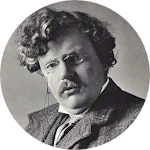Introductory Note:
Hang around me long enough, and you’ll learn two things early on. The first is that I adore the writings of G.K. Chesterton. The second is that I sing incessantly. And I don’t just sing songs that everyone accepts to be songs. Nope, I sing songs in the moment, often made up on the spot. Some activities just call for singing. Mine don’t always make sense, but they almost always have pretty good rhymes. This annoys my daughter (13) to no end; thankfully, my husband still finds it charming.
“Chesterton was a profoundly incarnational person,” writes Richard Foster in his introduction to “A Magical Universe” in Devotional Classics. It is no wonder, then, that Chesterton would ponder the rites of singing in medieval occupations—an act that often lifted the labors of working men and women to a holy endeavor—and then notice how our modern professionals keep strangely mum while on the job. And no wonder, too, that Chesterton would try to offer his own “few songs suitable for commercial gentlemen” to a banker and post-office employee with predictable (and comical) results. Where will these little birds who won’t sing find that connection to ritual and uplift that raises the mundane to the sacred in this “warp and woof of our very earthy existence”? Chesterton offers a clue.
I hope you’ll find a moment to sing today, and if I catch you at it, I’ll join in the chorus (with a swing of joy and energy)!
Justine Olawsky
On my last morning on the Flemish coast, when I knew that in a few hours I should be in England, my eye fell upon one of the details of Gothic carving of which Flanders is full. I do not know whether the thing is old, though it was certainly knocked about and indecipherable, but at least it was certainly in the style and tradition of the early Middle Ages. It seemed to represent men bending themselves (not to say twisting themselves) to certain primary employments. Some seemed to be sailors tugging at ropes; others, I think, were reaping; others were energetically pouring something into something else. This is entirely characteristic of the pictures and carvings of the early thirteenth century, perhaps the most purely vigorous time in all history.… If there was one thing the early mediaevals liked it was representing people doing something – hunting or hawking, or rowing boats, or treading grapes, or making shoes, or cooking something in a pot.… A mass of mediaeval carving seems actually a sort of bustle or hubbub in stone. Sometimes one cannot help feeling that the groups actually move and mix, and the whole front of a great cathedral has the hum of a huge hive.
.… .
But about these particular figures there was a peculiarity of which I could not be sure. Those of them that had any heads had very curious heads, and it seemed to me that they had their mouths open. Whether or no this really meant anything or was an accident of nascent art I do not know; but in the course of wondering I recalled to my mind the fact that singing was connected with many of the tasks there suggested, that there were songs for reapers and songs for sailors hauling ropes. I was still thinking about this small problem when I walked along the pier at Ostend; and I heard some sailors uttering a measured shout as they laboured, and I remembered that sailors still sing in chorus while they work, and even sing different songs according to what part of their work they are doing. And a little while afterwards, when my sea journey was over, the sight of men working in the English fields reminded me again that there are still songs for harvest and for many agricultural routines. And I suddenly wondered why if this were so it should be quite unknown, for any modern trade to have a ritual poetry. How did people come to chant rude poems while pulling certain ropes or gathering certain fruit, and why did nobody do anything of the kind while producing any of the modern things? Why is a modern newspaper never printed by people singing in chorus? Why do shopmen seldom, if ever, sing?
.… .
If reapers sing while reaping, why should not auditors sing while auditing and bankers while banking? If there are songs for all the separate things that have to be done in a boat, why are there not songs for all the separate things that have to be done in a bank? As the train from Dover flew through the Kentish gardens, I tried to write a few songs suitable for commercial gentlemen. Thus, the work of bank clerks when casting up columns might begin with a thundering chorus in praise of Simple Addition.
“Up my lads and lift the ledgers, sleep and ease are o’er.
Hear the Stars of Morning shouting: ‘Two and Two are four.’
Though the creeds and realms are reeling, though the
sophists roar,
Though we weep and pawn our watches, Two and Two are Four.
There’s a run upon the Bank–
Stand away!
For the Manager’s a crank and the Secretary drank,
and the Upper Tooting Bank
Turns to bay!
Stand close: there is a run
On the Bank.
Of our ship, our royal one, let the ringing legend run,
that she fired with every gun
Ere she sank.
.… .
And as I came into the cloud of London I met a friend of mine who actually is in a bank, and submitted these suggestions in rhyme to him for use among his colleagues. But he was not very hopeful about the matter. It was not (he assured me) that he underrated the verses, or in any sense lamented their lack of polish. No; it was rather, he felt, an indefinable something in the very atmosphere of the society in which we live that makes it spiritually difficult to sing in banks. And I think he must be right; though the matter is very mysterious. I may observe here that I think there must be some mistake in the calculations of the Socialists. They put down all our distress, not to a moral tone, but to the chaos of private enterprise. Now, banks are private; but post-offices are Socialistic: therefore I naturally expected that the post-office would fall into the collectivist idea of a chorus. Judge of my surprise when the lady in my local post-office (whom I urged to sing) dismissed the idea with far more coldness than the bank clerk had done. She seemed indeed, to be in a considerably greater state of depression than he. Should any one suppose that this was the effect of the verses themselves, it is only fair to say that the specimen verse of the Post-Office Hymn ran thus:
O’er London our letters are shaken like snow,
Our wires o’er the world like the thunderbolts go.
The news that may marry a maiden in Sark,
Or kill an old lady in Finsbury Park.
Chorus (with a swing of joy and energy):
Or kill an old lady in Finsbury Park.
And the more I thought about the matter the more painfully certain it seemed that the most important and typical modern things could not be done with a chorus. One could not, for instance, be a great financier and sing; because the essence of being a great financier is that you keep quiet. You could not even in many modern circles be a public man and sing; because in those circles the essence of being a public man is that you do nearly everything in private. Nobody would imagine a chorus of money-lenders. Every one knows the story of the solicitors’ corps of volunteers who, when the Colonel on the battlefield cried “Charge!” all said simultaneously, “Six-and-eightpence.” Men can sing while charging in a military, but hardly in a legal sense. And at the end of my reflections I had really got no further than the sub-conscious feeling of my friend the bank-clerk – that there is something spiritually suffocating about our life; not about our laws merely, but about our life. Bank-clerks are without songs, not because they are poor, but because they are sad. Sailors are much poorer. As I passed homewards I passed a little tin building of some religious sort, which was shaken with shouting as a trumpet is torn with its own tongue. THEY were singing anyhow; and I had for an instant a fancy I had often had before: that with us the super-human is the only place where you can find the human. Human nature is hunted and has fled into sanctuary.


